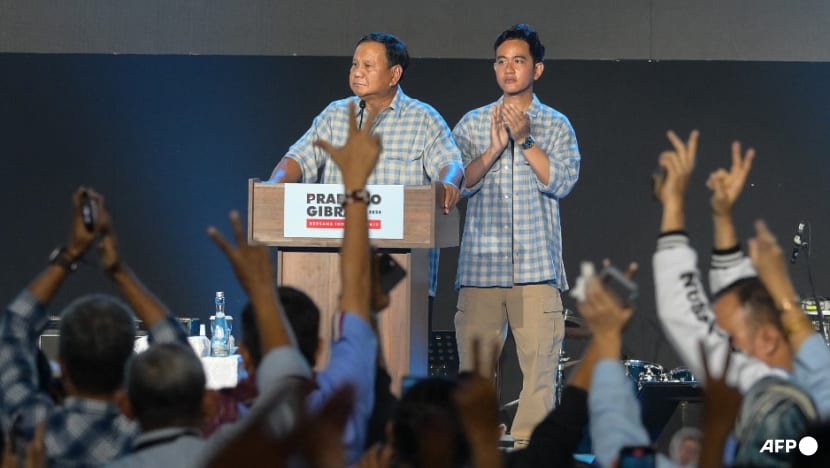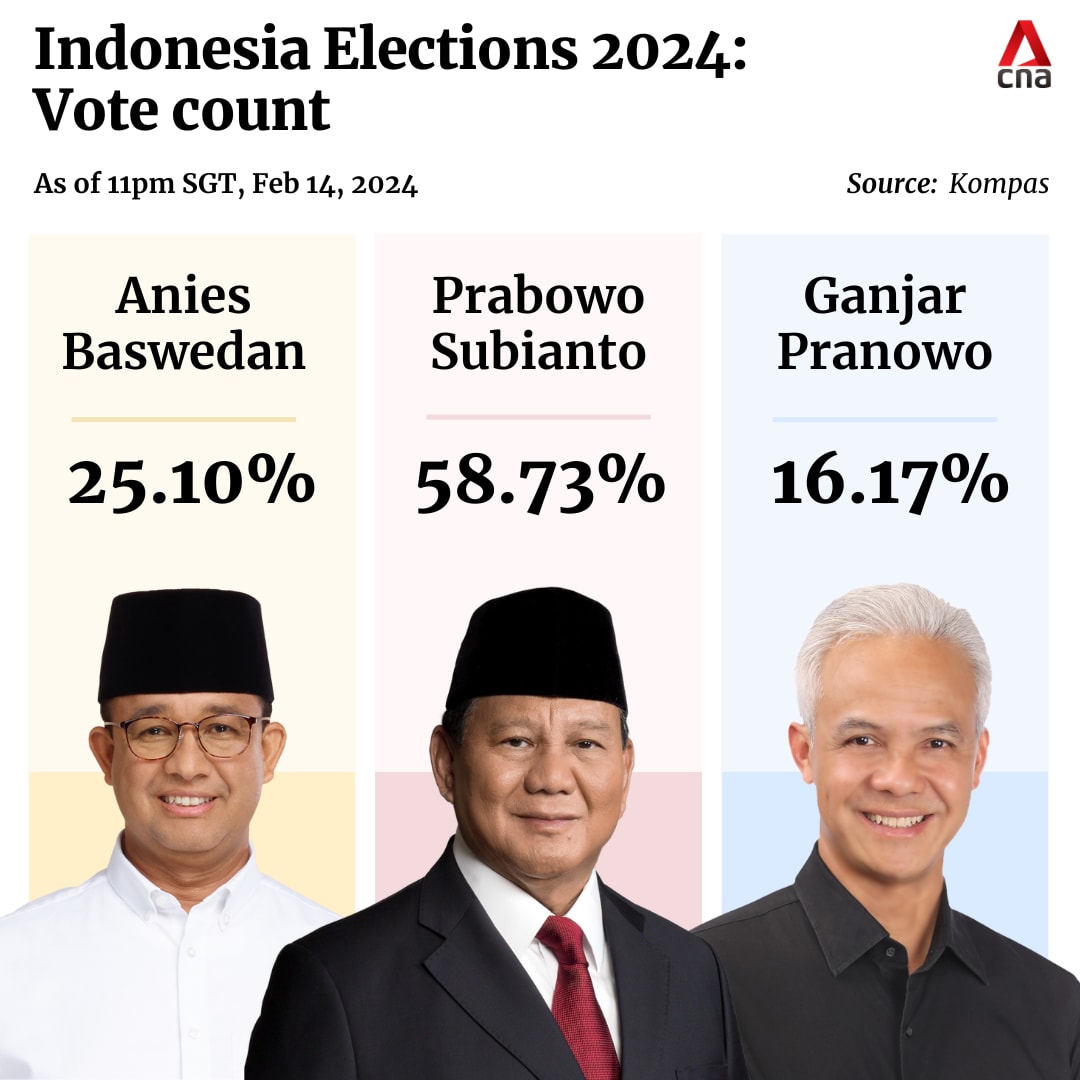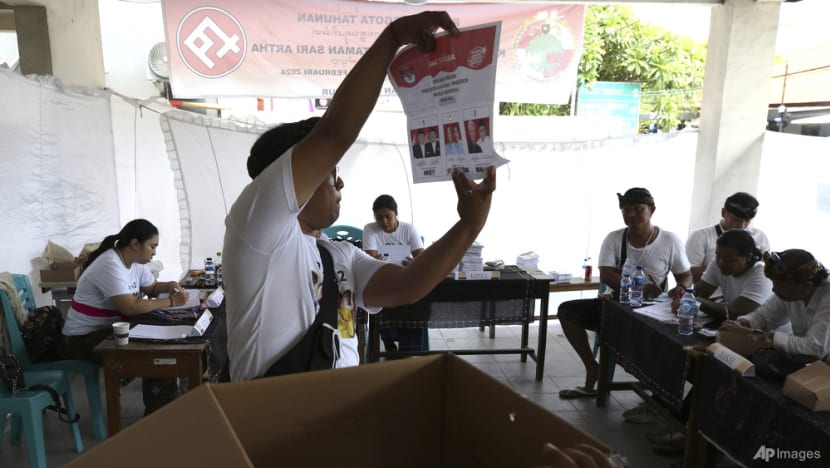Prabowo pledges to be president for all Indonesians, form govt of ‘best people’ despite rivals not conceding yet
Quick counts by reputable pollsters based on a sampling of ballots across polling stations in Indonesia showed Mr Prabowo garnering about 58 per cent of votes, enough to win the presidential poll in one round.


This audio is generated by an AI tool.
JAKARTA: Presidential candidate and defence minister Prabowo Subianto has pledged to lead, protect and defend all Indonesians as he claimed victory hours after polling closed on Wednesday (Feb 14), with independent quick counts showing he had won nearly 60 per cent of votes.
With his vice-presidential running mate Gibran Rakabuming Raka – who is also incumbent president Joko Widodo’s son – by his side, Mr Prabowo said the country must unite once more as “the campaign is over”, and that “this victory is for all Indonesian people”.
“We will be president and vice-president for all Indonesians,” he declared, while speaking to thousands of supporters at a packed sports arena.
“I have repeatedly emphasised that we will lead, protect and defend all Indonesian people, whatever their race, ethnicity, religion, social background. All Indonesians will be our responsibility, to safeguard their interests.
“We will build a government consisting of the best people of Indonesia.”
Quick counts by reputable pollsters such as Indikator Politik Indonesia, Litbang Kompas and Indonesian Survey Circle (LSI), based on a sampling of ballots across polling stations in Indonesia, showed Mr Prabowo garnering about 58 per cent of votes.
This puts him well ahead of rivals Mr Anies Baswedan with about 25 per cent of votes, and Mr Ganjar Pranowo with about 16 per cent.
Mr Anies and Mr Ganjar, however, have not conceded defeat and cited reports of electoral fraud.

“Don’t be influenced by these surveys,” said Mr Thomas Lembong, the deputy leader of Mr Anies’ campaign team. Counting remains dynamic and is expected to continue over the next few days, he said. “The journey is still long.”
“We have to be brave and patient, and not too quick to make conclusions,” Mr Thomas added.
Mr Ganjar also urged people to wait for the final results, saying: “We’re still working. No fight (effort) is in vain … we are still energised.”
Mr Arsjad Rasid, head of Mr Ganjar’s campaign team, also urged anyone with evidence of any irregularities on the ground to report them to the team. “Friends, don’t stop. Let’s continue to safeguard this,” he said.
The country’s General Elections Commission (KPU) has until Mar 20 to tally the votes and announce an official result.
Should the KPU confirm Mr Prabowo’s win, the 72-year-old retired general will be sworn in as Indonesia’s eighth president on Oct 20 with Mr Gibran, 36, as vice-president.
Mr Widodo is barred by the country’s Constitution from seeking a third term in office.
The candidates can still challenge the result of the election and petition the country’s Constitutional Court to order a recount or have the KPU redo the ballot process in some areas.
Related:
PRABOWO’S METEORIC RISE
The win is third-time lucky for Mr Prabowo, a former special forces commander with a checkered human rights record. Although unsuccessful in 2014 and 2019 against a victorious Mr Widodo, his previous bids to be president made him the most experienced and well-known candidate in this election.
Mr Prabowo has promised to continue Mr Widodo’s policies and infrastructure drives, particularly the ambitious plan to move the country’s capital from the overcrowded and polluted Jakarta to Nusantara, in a once-remote part of East Kalimantan province.
This and the fact that Mr Prabowo had picked Jokowi’s elder son, Mr Gibran, as his running mate, are seen as reasons why Mr Prabowo has enjoyed the vote of confidence from legions of Mr Widodo’s fans.

“Partnering with Gibran provides reassurance to many Jokowi supporters that Prabowo will indeed continue programmes like direct cash assistance and infrastructure development,” Mr Burhanuddin Muhtadi, a visiting fellow at ISEAS-Yusof Ishak Institute’s Indonesia Studies Programme, told CNA.
“For people of lower income (background), of which there are millions, Jokowi’s direct cash assistance programmes have been very helpful.”
Mr Burhanuddin noted that Mr Prabowo’s rival, Mr Ganjar, had also promised to continue many of Jokowi’s policies and programmes, and both candidates were neck and neck last year in popularity polls.
That changed when Mr Prabowo picked Mr Gibran as his running mate in October.
“(Prabowo’s) poll numbers jumped significantly after Gibran’s nomination. As (the popularity of) Prabowo rose, Ganjar dipped,” said Mr Burhanuddin.
Meanwhile, Mr Anies had been campaigning for a change in how the government is run, attracting those critical of Jokowi’s reign.
LONG ROAD TO DEMOCRATIC MATURITY
The Prabowo-Gibran ticket was supported by a coalition of nine political parties. His two opponents meanwhile are each supported by four parties.
With Mr Prabowo set to be the country’s next president, Mr Burhanuddin predicts his coalition will expand, attracting parties that originally supported Mr Anies or Mr Ganjar.
“Prabowo has said that he is willing to work with anyone,” he noted.
But academics and civil society groups – who have already lamented the erosion of democracy during the campaign – may be dismayed by such an outcome.
“I worry that there will not be any opposition (to Mr Prabowo’s presidency). Even if there is, it will be uneven and ineffective,” Mr Burhanuddin said.
Political analyst Mr Yoes Kenawas from Jakarta’s Atma Jaya University said that many Indonesians are also worried about the rise of political dynasties in Indonesia.
“This election has set a bad precedent,” Mr Yoes told CNA.
Mr Gibran was originally not qualified to run as the 2017 Law on Election stated that a presidential or vice presidential candidate must be at least 40 years of age.
However, the Constitutional Court in October – chaired by his uncle, then-chief justice Anwar Usman – ruled that the requirement does not apply to an elected public official. Gibran is currently the mayor of Surakarta, better known as Solo.
The court decision sparked widespread protests across the nation.
There have also been allegations that Mr Widodo mobilised or condoned the mobilisation of public officers to support Mr Prabowo's campaign.
“Indonesia is the third-largest democracy … we have celebrated, and played such an important role in promoting democracy in the region, the Association of Southeast Asian Nations, and also globally. Now Indonesia's democracy is a big question mark to us, and for me I'm broken-hearted,” research professor Dewi Fortuna Anwar of the National Research and Innovation Agency (BRIN) told CNA’s election result show.
But as this election has shown many Indonesians are willing to look past the issue, Mr Yoes said, in exchange for programmes like cash aids for the poor and other incentives.
Mr Prabowo’s vote share, which surpasses that in pre-election surveys earlier this month, suggests the majority of the voters want a continuation of Jokowi's policies, Mr Yoes said.
“Prabowo's campaign has been effective to attract voters' support, especially the young voters. The use of political gimmicks has been effective to shift the policy debates into likes and dislikes,” Mr Yoes said.
We have not yet matured as a democracy. An election is supposed to be about choosing the best candidate with the best track records and ideas. But sadly, we are not there yet."
WHICH PARTY WILL DOMINATE IN PARLIAMENT?
On Wednesday, Indonesians also cast their votes for over 20,000 posts in the legislative elections.
The latest quick count results from both the Indonesian Survey Circle (LSI) and the Centre for Strategic and International Studies (CSIS) as of 9.35pm indicate that the Indonesian Democratic Party of Struggle (PDIP), which is the party of Mr Ganjar and also Mr Widodo, will emerge as the largest party in the 580-seat parliament.
According to LSI, PDIP is leading with 17.69 per cent, followed by Golkar and Gerindra at 15.18 per cent and 13.7 per cent, respectively, based on 70.15 per cent of the sample ballots.
In the CSIS quick count, PDIP is also in the lead with 17.02 per cent, based on 66.45 per cent of the sample. Golkar follows with 15.11 per cent, trailed by Gerindra with 13.89 per cent.
These preliminary results indicate that the Prabowo-led Advanced Indonesia Coalition - which counts Gerindra and Golkar among its members - will need to expand its coalition to secure a parliamentary majority, to avoid potential gridlock with a PDIP-led parliament.
Additional reporting by Ericssen























